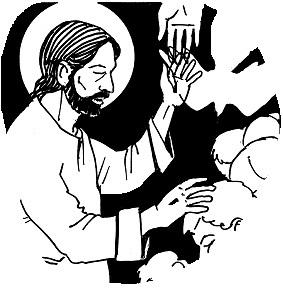
"May they all be one, as you, Father are in me and I in you, that they may also be in us, that that world may believe that you sent me" (John 17:21).
Acts 22:30; 23:6-11; Jn 17:20-26
Today’s Gospel reading delves into the core mystery of God as a dynamic community of Persons, not a solitary, eternal Being. The point of entry into this mystery is not the ineffable divinity but the human reflection of that ultimate source of life in Jesus as he reveals to his disciples his mutual love for his Father and their Holy Spirit. We know God in our intimate relationship with this divine Trinity of love, whose pattern of self-emptying love (kenosis) is stamped on our personal and communal identity.
Because we are created in the image and likeness of God, our mission is to reflect this image within and among ourselves. God is a community of love, and our destiny is to reveal that beloved community. Wherever a group of people attempts this unity in love, God is revealed. The enchanting hymn, Ubi Caritas, a signature of the ecumenical community of Taizé, professes this core truth of human longing to reveal God: “Where there is love, there is God.” This can be in a marriage or partnership, a small intentional community, a simple friendship, or among the religions of the world. Mutual love is the sacramental sign of God's presence.
Creating community is never easy. When we attempt to love another, we encounter the self-centered, exclusive tendencies we all exhibit as part of the influence of sin. We want our own way, our own space, and we are quicker to see selfishness in others than in ourselves. This is why so few communities advance beyond the initial attraction to reconcile differences, forgive and renew their common purpose in order to deepen mature love.
In John's farewell discourses, Jesus reveals the secret of his own inner life; he is one with the Father. His disciples will share this unity by loving one another. God's inner life of love is the dynamic source of all life, and by restoring this fundamental pattern of love, the world will be restored to God's original plan. As part of this mystery, we advance God's plan every time we love others, mirroring God’s unity in diversity.
Jesuit Karl Rahner, one of the brilliant theologians advising the bishops at Vatican II, explored the idea of the “Liturgy of the World” as the celebration of the communal nature of God. This provocative idea provided the basis for dialogue and shared worship among world religions and the path to reconcile conflicts derived from religious differences. (Consider the role that religion is playing in the Russian invasion of Ukraine.)
The greatest threat to unity in both the world and in the church is not resistance from without, but division within. When we refuse to seek unity through forgiveness and dialogue, we distort the central sign of unity that is the Gospel we are to preach to the world. A divided church fails its primary mission to witness the mystery of God.
The sign that the Holy Spirit has truly come to rest on us at Pentecost will be our love for one another, especially where conflict has divided us. Unity in diversity is what will show the world that God truly dwells among us.








